Dhanada Kanta Mishra
Hong Kong’s season of unrest seems to be overflowing. What started with mammoth non-violent protests against the infamous amendment proposed to the extradition bill is, with its unprecedented violence fast transforming into a kind of ‘civil war’. Far from the original issue of the withdrawal of the extremely unpopular amendment proposal, it is now about the resignation of the chief executive, the accountability of the police force and even the very future of Hong Kong under the one country, two systems rule. The society is more divided than ever, with a pro-establishment faction trying to match the strength, if not passion, of the protesters by not only holding demonstrations in support of the police actions and the bill but, most recently, seemingly resorting to outright violence. Such violence has not spared even innocent bystanders.
Many have proposed different ways to help address the contentious issue and avoid further violence and possible bloodshed. Most declarations by the chief executive, including of the suspension of the bill, have not been able to placate the youth and students, whose trust deficit is too wide to be bridged with mere words. Academicians, including presidents of universities, have volunteered to facilitate talks between the government and protesters. Some have suggested extended jurisdiction for Hong Kong courts as one way around the vexed issue. But none of the proposals seemingly has the power to heal the wounds and find widespread acceptance. In such a situation, outside-the-box thinking is required for a possible resolution, learning from successful examples in the rest of the world.
Ireland is well known for its traditionally conservative catholic society, which for a long time was staunchly opposed to abortion under any circumstance and refused recognition of same-sex marriages. Ireland’s Citizens’ Assembly (https://www.citizensassembly.ie/en/), formed in 2016, broke the deadlock on both these controversial issues. The recommendations of the assembly informed public debate and emboldened politicians to advocate for change.
A citizens’ assembly brings a small representative group of people together to learn, deliberate and make recommendations on an issue of public concern. Similar to jury service, members are randomly selected from the population by a process called sortition. Stratified sampling techniques are used to ensure that the assembly is representative in terms of key characteristics such as gender, age, ethnicity, education level and geography. Assembly members learn about critical thinking before they hear balanced information from experts and stakeholders. The members spend time deliberating in small, facilitated groups and then draft and vote on recommendations. Citizens’ assemblies are conducted by non-partisan organisations under independent oversight. They are transparent, inclusive and effective. Such assemblies are being used around the world in countries such as the UK, Canada, and Australia. They have demonstrated that the general public can understand complex information, deliberate on options and make fair and impartial choices. Citizens’ assemblies are often used to address issues that are deemed too controversial and difficult for politicians to deal with successfully by themselves.
In Hong Kong’s form of democracy, power lies in the hands of a few representatives, the majority of whom are not even directly elected by the people. The short electoral cycles of up to five years in the system of representative democracy discourage governments from attending to issues with long-term implications, such as the current crisis. Democratic representatives are lobbied by powerful corporations, seek sympathetic media coverage and calculate their policies based on the potential reaction of the media and the public, as measured by opinion polls. This means politicians often feel unable to propose the bold changes necessary to address an emergency.
The formation of a properly constituted citizens’ assembly would to a large extent restore the broken trust in governance. It would give all parties to the conflict a break, as the process takes its time. It would break the deadlock by giving politicians access to public judgements that have been reached in a fair and informed way. This would help politicians commit to actions justified by the mandate they receive from the citizens’ assembly, reducing the potential public backlash at the ballot box.
Citizens’ assemblies can be used when difficult trade-offs are necessary. For example, experts might propose policies on how to replace the proposed amendment to the extradition law with a number of more acceptable legal frameworks, and the citizens in the assembly would then decide which one they prefer. For example, they might recommend a referendum with clear terms of reference, as was the case in Ireland. Eventually, the referendum outcome in support of lifting the restrictions on abortion was very close to the vote in the 100-member assembly.
Hong Kong is passing through a critical phase of turmoil. The youth are disturbed to their core, uncertain about the outcome of the current events and their eventual future. On top of anxieties regarding the mainland’s interference in the island’s affairs, economic pressures, growing inequality and a lack of affordable housing are all adding to the expression of frustration on the streets. Their concerns need to be handled with the utmost sensitivity and care. Among all the options available, a citizens’ assembly holds the best promise for a just and fair outcome for all stakeholders, while also healing the wounds inflicted by the prolonged disturbance and conflict. It is the best vehicle to make the wide-ranging dialogue with all sections of society often promised by the chief executive a reality.
The writer holds a doctorate in civil engineering from the University of Michigan and is a professor of Civil Engineering at Biju Patnaik University of Technology and Principal of KMBB College of Engineering and Technology. He is currently visiting the Hong Kong University of Science and Technology as a Research Scholar.
